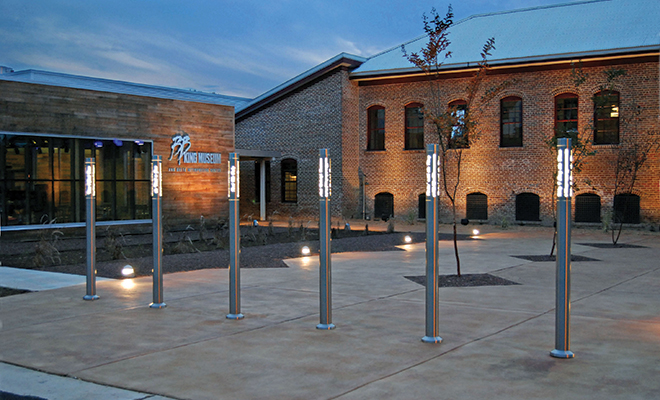
The Intersection of The Blues and Civil Rights: A Road Trip Through Mississippi Delta History
The Mississippi Delta may have been divinely chosen to birth blues music into the world and, as B.B. King once suggested, light the flame of integration and the civil rights movement in the United States. This gritty region, like the clay, sand and silt of the Mississippi River on which it is built, is surrounded by cotton fields as far as the eye can see.
The blues had been sung in the South since the 1800s but, as early blues performers noted, “white people didn’t hear it.” The genre grew in popularity with the younger generation of the ’60s when white teens started flocking to concerts. B.B. King describes weeping openly on stage one night in Memphis, Tennessee. He later explained that the tears were triggered by noticing that the typical 90 percent black audience had changed to 95 percent white. Integration through music was blossoming before blues singers’ eyes. The music of the Delta plantations and streets was taking off and, understandably, so was the beginning of the civil rights movement.
Today, both the civil rights struggle and the blues are celebrated throughout small Delta towns and often-forgotten trails that run through Mississippi between Birmingham, Alabama, and Memphis, Tennessee. The journey takes you to town after town, each treasuring their often-painful past. Discounting these towns would be a mistake for any Southern road trip.
Cleveland, Mississippi
Dockery Farms was home to a number of the blues pioneers. Today, it is still a venue hosting parties and workshops. The placard in front of the history-steeped stop reads “Birthplace of the Blues?” Lost to time as many great beginnings are, no one knows for sure of the claimed origin, so to end in a question mark is accurate. We do, however, know that Charles Patton, Howlin’ Wolf and Pops Staples were there, just to drop a few names.
GRAMMY Museum® Mississippi was the first official GRAMMY Museum outside of Los Angeles. This notable museum displays Mississippi’s role in shaping American music. Interactive and entertaining, you cannot understand the gravity of this art form without a visit.
Greenwood
While I was visiting Greenwood, a miniseries based on the life of murdered Emmett Till was being filmed. The town was filled with producer Will Smith and Emmy®-winning actors retelling one of the saddest stories in American history. Years ago, The Help was filmed in part on those same streets. The Tallahatchie Bridge that Bobbie Gentry made famous by her first-person narrative lyrics in the fictional song “Ode to Billie Joe” straddles the muddy waters.
Today, Greenwood is home to The Alluvian Hotel, Spa and Viking Cooking School; the famous Viking Ranges are manufactured in Greenwood. Stylish and steeped in history, Giardina’s Restaurant’s private, draped dining rooms include a nod to prohibition, with functional buttons to order…ahem…ice.
Clarksdale
This is a determined town where Brooklyn vibes mingle with southern charm, Blues and a relentless urge to preserve and repurpose. Morgan Freeman’s Ground Zero Blues Club is poetically situated across from the Rock & Blues Museum. Decorated in juke joint style, this famous club might be passed over as a dilapidated dwelling of the past in any other region of our country instead of the Mecca for great music that it is.
Clarksdale also boasts music every night somewhere on its streets in public as well as virtually in our almost-post-COVID world. An annual Juke Joint Festival makes this town pop each spring bringing alive the sounds once heard only in plantation commissaries and front porches. Blues music store Cat Head and Hambone Art & Music round out what is a town in tribute to its past with a creative industrious eye to the future.
Tunica
Home to the Blues and Legends Hall of Fame, Tunica is also known for its many casinos. There is a wide assortment of music and casino life as well as restaurants boasting Delta cuisine.
Indianola
The very impressive B.B. King Museum and Delta Interpretive Center sit on unassuming Second Street in Indianola. The icon’s recording studio, guitars, performance clothes, wisdom and art are on display to promote the Blues as much as the performer who made it mainstream.
Blues music needs to be viewed in the rearview mirror of history for triumphing over the evils of racism and the windshield of the future as a vibrant musical form with not just a tradition but a pathway of the heart that brings the country to kinder life for all. ■
Sources: dockeryfarms.org, deltastate.edu, thealluvian.com, tunicatravel.com and bbkingmuseum.org.







